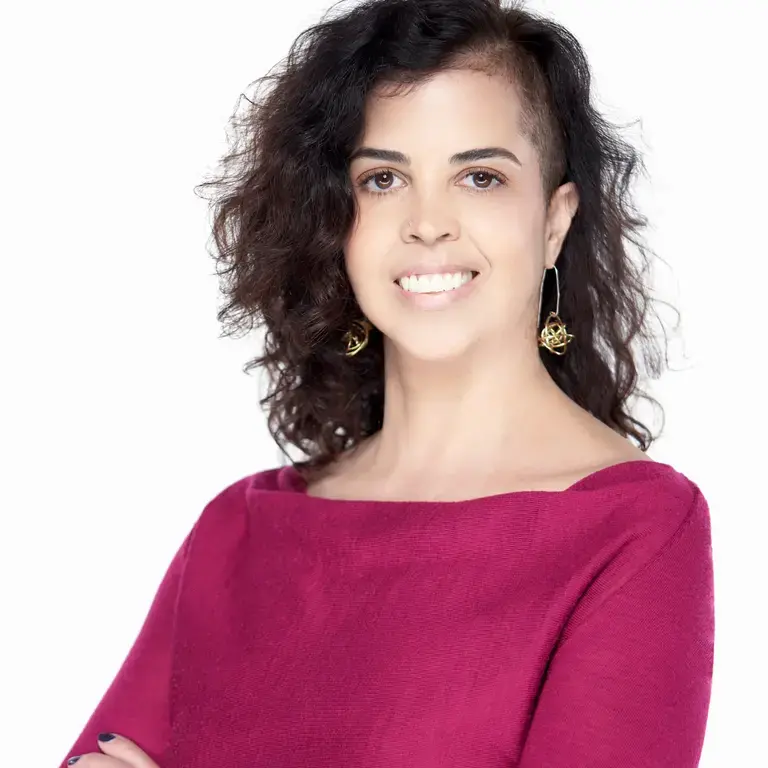Narrative Medicine Lecturer Olga Lucia Torres was a successful criminal defense attorney in New York City managing multiple chronic illnesses including arthritis, lupus, and scleroderma, as well as a childhood pituitary adenoma. But after surviving a devastating brain injury in 2000, Olga decided to change careers. She returned to school and earned an M.S. in Narrative Medicine from Columbia University, where she now teaches Pedagogy: Goals, Methods, Context and Social Justice: Narratives of Inequality. This course guides participants in tailoring Narrative Medicine pedagogy to specific learners: health care professionals, students of the health professions, clinical trainees, patients, families, and those outside of health care settings. It enables participants to articulate the goals of the pedagogy of a particular learning project, specify learning objectives, and design a curriculum with the potential to reach its goals.
Here, she writes about the experience that led her to the program, the importance of listening to patients’ stories, and how narrative medicine addresses issues of structural inequality and social justice in health care.
“I want to go back to school,” I said to my husband.
He gave me a side glance. I wasn’t sure if he was thinking, Really? You already have a law degree. Or, You think that’s a good idea after spending the last six years learning how to read, write, and walk again?
I understood his concern. I had miraculously survived a debilitating brain injury. Did I really want to go back to school and get a master’s degree? Spend all those hours studying? Yes. I did. I felt called.
Years earlier, as a busy Bronx defender, I never imagined that racist neglect would result in a coma and subsequent brain damage. I never imagined that seeking simple care for food poisoning would strip me of basic skills and my ability to practice law.
As a BIPOC (Black, Indigenous, and people of color) female in a large hospital, I had been egregiously ignored. Meanwhile, my white female roommate had daily visits from her doctors and nurses. I truly believe if I had been white, I would have received far superior treatment, especially if I was someone with equal credentials. But alas, my degrees and education didn’t matter. I was “just” a Latina. They’d get to me eventually, except they never did.
I had never seen the correlation between the criminal-injustice system and the health-care system before this experience. At the time of the accident, death by medical mistake was the third leading cause of death in the United States, and now it has been bumped to the fourth leading cause of death by COVID. Both inmates and patients are at the mercy of their caregivers and have limited to no input in their care.
I had experienced how broken the health-care system is and now wanted to do my part in fixing it. For me, that meant addressing the communication between the providers and the patients.
When I stumbled upon the Narrative Medicine master’s program at Columbia University, I knew it was the right program. Narrative Medicine seeks to improve the health-care system by setting up a dynamic where providers become radical listeners and patients become honest and fearless storytellers. As the field has evolved, narrative medicine addresses issues of structural inequality and social justice in health care and has grown from Columbia University Irving Medical Center (CUIMC) to Columbia University to medical schools around the world.
With my husband’s support, I enrolled in the program, studied day and night, and am now a proud teacher and lecturer in the Certification of Professional Achievement in Narrative Medicine program at the Columbia University School of Professional Studies. It’s been such a delightful departure from law in that my listening skills have completely transformed. When I was a criminal defense attorney, I was the voice for my clients. I listened for the next question to ask to win my case. Now, as a patient advocate, I listen to my patients’ stories. My “job” is to be present, to be a witness to their narratives. The ultimate goal is to help them be their own health-care advocate so they can better communicate with providers.
It’s easy to become voiceless when you’re sick and scared and unsure of the proper protocol. People think their input doesn’t matter. And depending on the color of your skin, some doctors and nurses will make you feel like your input doesn’t matter, as they did with me. That’s why it’s so important for everyone to know their stories and learn how to tell them fearlessly. Patient stories have to come first. I never got a chance to tell my story—my complaints of feeling unwell were ignored. When I pointed out that upon admission I was told my blood needed to be drawn every three to four hours, I continued to be ignored. And then it was too late.
I wouldn’t go so far as to say I am grateful for that bad piece of jerk chicken I ate from the food truck that day, landing me in an unnecessary coma, but I will say I am so grateful for my new career path and my unrelenting desire to fight for the underdog.
About the Program
Columbia University’s Master of Science in Narrative Medicine prepares health professionals, writers, and scholars to apply the skills and values of narrative understanding to improve outcomes for both patients and caregivers. It offers a rigorous and in-depth study of close reading of creative texts, illness and disability narratives, narrative ethics, philosophy, creative writing, and other perspectives.
The program, which Lecturer Dr. Rita Charon founded at Columbia University, is the first of its kind. The founding professionals included pediatricians, film scholars, novelists, internists, and others. These individuals shaped the concept of narrative medicine and established the program to share with students the practices and strategies they developed.
Fall 2023 application deadlines for the M.S. in Narrative Medicine program are February 15, 2023, for the priority deadline; March 15 for applicants with international documents; and June 15 for the final deadline. Learn more here.



